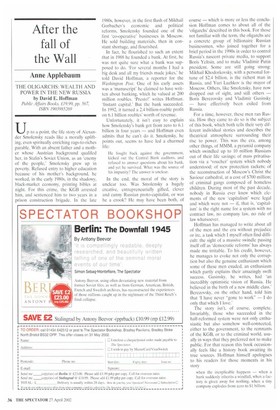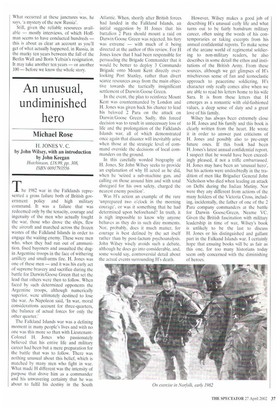After the fall of the Wall
Anne Applebaum
THE OLIGARCHS: WEALTH AND POWER IN THE NEW RUSSIA by David E. Hoffman Public Affairs Books, £19.99, pp. 567, ISBN 1903985269 Up to a point, the life story of Alexander Smolensky reads like a morally uplifting, even spiritually enriching rags-to-riches parable. With an absent father and a mother whose Austrian background quaffed her, in Stalin's Soviet Union, as an 'enemy of the people,' Smolensky grew up in poverty. Refused entry to higher education because of his mother's background, he worked, in the early 1980s. in the shadowy, black-market economy, printing bibles at night. For this crime, the KGB arrested him, and sentenced him to two years in a prison construction brigade. In the late
1980s, however, in the first flush of Mikhail Gorbachev's economic and political reforms, Smolensky founded one of the first 'co-operative' businesses in Moscow. He sold building materials, then in constant shortage, and flourished.
In fact, he flourished to such an extent that in 1988 he founded a bank. At first, he was not quite sure what a bank was supposed to do. 'For several months I had a big desk and all my friends made jokes,' he told David Hoffman, a reporter for the Washington Post. One of his early assets was a 'manuscript' he claimed to have written about banking, which he valued at 200 million roubles. 'Presto!' writes Hoffman. 'Instant capital.' But the bank succeeded. In 1992, it turned a 2.4 billion-rouble profit on 6.1 billion roubles' worth of revenue.
Unfortunately, it isn't easy to explain how Smolensky's bank got from zero to 6.1 billion in four years — and Hoffman even admits that he can't do it. Smolensky, he points out, seems to have led a charmed life:
He fought back against the government, kicked out the Central Bank auditors, and refused to answer questions about his bank, and yet he survived. What was the source of his impunity? The answer is unclear.
In the end, the moral of the story is unclear too. Was Smolensky a hugely creative, entrepreneurially gifted, clever and canny Russian proto-capitalist, or was he a crook? He may have been both, of
course — which is more or less the conclusion Hoffman comes to about all of the 'oligarchs' described in this book. For those not familiar with the term, the oligarchs are a concrete group of billionaire Russian businessmen, who joined together for a brief period in the 1990s in order to control Russia's nascent private media, to support Boris Yeltsin, and to make Vladimir Putin president. Some are still going strong: Mikhail Khodorkovsky, with a personal fortune of $2.4 billion, is the richest man in Russia, and Yuri Luzhkov is the mayor of Moscow. Others, like Smolensky, have now dropped out of sight, and still others — Boris Berezovslcy and Vladimir Gusinsky — have effectively been exiled from Russia.
For a time, however, these men ran Russia. How they came to do so is the subject of this book, which both tells their very different individual stories and describes the theatrical atmosphere surrounding their rise to power. This was the era, among other things, of MMM, a pyramid company which swindled up to 10 million Russians out of their life savings: of mass privatisation via a 'voucher' system which nobody understood; of new protection rackets; of the reconstruction of Moscow's Christ the Saviour cathedral, at a cost of $700 million; of criminal gangs composed of homeless children. During most of the past decade, nobody in Russia ever knew which elements of the new 'capitalism' were legal and which were not — if, that is, 'capitalism' is the right name for a system with no contract law, no company law, no rule of law whatsoever.
Hoffman has managed to write about all of the men and the era without prejudice or ire, a task which I myself often find difficult: the sight of a massive swindle passing itself off as 'democratic reforms' has always made me irritable. To his credit, however, he manages to evoke not only the corruption but also the genuine enthusiasm which some of these men exuded, an enthusiasm which partly explains their amazingly swift success. Gusinsky, he writes, had 'an incredibly optimistic vision of Russia. He believed in the birth of a new middle class.' Berezovsky, on the other hand, told him that 'I have never "gone to work" — I do only that which I love.'
The story isn't, of course, complete. Invariably, those who succeeded in the half-reformed system were not only enthusiastic but also somehow well-connected, either to the government, to the remnants of the KGB, or to the criminal world, usually in ways that they preferred not to make public. For that reason this book occasionally feels like a history book awaiting its true sources. Hoffman himself apologises to his readers for those moments in his story
when the inexplicable happens — when a bank suddenly inherits a windfaii, when a factory is given away for nothing, when a tiny company explodes from zero to $1 billion.
What occurred at these junctures was, he says, `a mystery of the new Russia'.
Still, given the reliable resources available — mostly interviews, of which Hoffman seems to have conducted hundreds — this is about as clear an account as you'll get of what actually happened, in Russia, in the murky ten years between the fall of the Berlin Wall and Boris Yeltsin's resignation. It may take another ten years — or another 100 — before we know the whole story.



































































 Previous page
Previous page